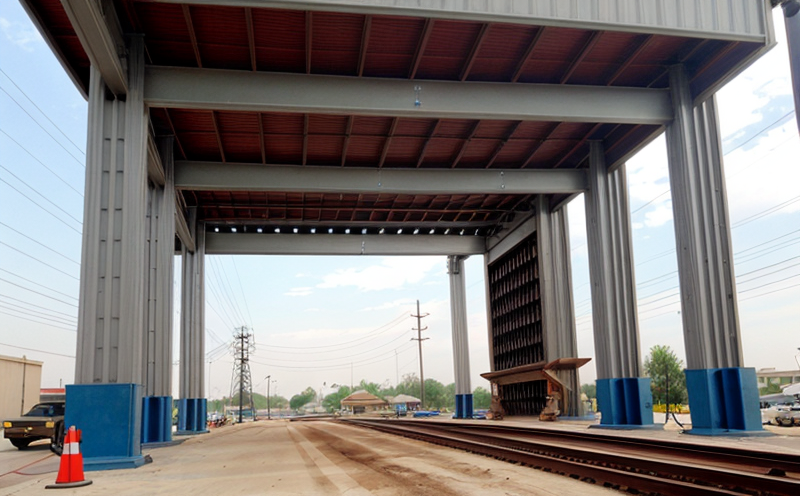FAA AC 20-152 Propeller Structural Integrity Testing
The Federal Aviation Administration (FAA) Advisory Circular AC 20-152 is a critical document that provides guidance on the testing and certification of aircraft propellers. This service ensures compliance with FAA regulations for structural integrity, which is paramount in aviation safety.
Structural integrity testing under FAA AC 20-152 involves rigorous inspection and evaluation to verify that propeller components meet stringent fatigue strength requirements. The process encompasses a comprehensive approach to assess the durability of materials used in propeller construction and their ability to withstand operational stresses over time without failure.
The primary objective of this testing is to ensure that propellers can operate safely under expected conditions, including varying flight environments such as high altitudes, extreme temperatures, and diverse atmospheric pressures. Compliance with AC 20-152 not only ensures regulatory adherence but also enhances the trustworthiness and reliability of aviation components.
Our laboratory adheres to international standards like ISO 9001 for quality management systems and ISO/IEC 17025 for proficiency in testing and calibration. We employ advanced testing equipment, including fatigue testers capable of simulating real-world flight conditions accurately. Our technicians are trained to follow FAA guidelines precisely to deliver reliable test results.
Before initiating the structural integrity tests, it is essential to prepare the propeller specimens properly. This involves ensuring that all components are clean and free from any defects or external damage. The specimens undergo detailed visual inspections followed by non-destructive testing (NDT) methods like ultrasonic testing and radiography to identify potential flaws.
The fatigue testing process simulates operational cycles under controlled conditions, often involving a combination of stress and strain over extended periods. This helps in determining the material's resistance to fatigue cracking and other forms of structural damage. The test results are meticulously recorded and analyzed using sophisticated software tools to generate detailed reports that comply with FAA AC 20-152 requirements.
Post-testing, our team performs a thorough inspection of the specimens for any visible changes indicative of material degradation or failure. This step ensures that all aspects of the propeller's structural integrity are comprehensively evaluated. The final report includes not only the test results but also recommendations based on the findings to enhance future designs and manufacturing processes.
By adhering strictly to FAA AC 20-152, our laboratory provides a robust service that supports aviation safety standards. This commitment to excellence ensures that propellers are reliable and safe for use in various aircraft configurations.
Eurolab Advantages
At Eurolab, we pride ourselves on offering unparalleled expertise and comprehensive services tailored specifically to meet the stringent requirements set by FAA AC 20-152. Our advantages are manifold:
- Comprehensive Knowledge Base: Our team of experts has deep knowledge in aerospace materials and their behavior under stress, ensuring accurate testing.
- Advanced Equipment: Equipped with state-of-the-art fatigue testers that can simulate a wide range of operational conditions.
- Accreditation: Recognized for ISO/IEC 17025 accreditation, ensuring the highest standards in testing and calibration.
- Custom Solutions: Tailored test protocols that align with specific propeller designs and operational requirements.
- Compliance Expertise: Our team is well-versed in FAA regulations, ensuring full compliance throughout the testing process.
- Rapid Turnaround: Efficiently handling test requests to meet critical deadlines without compromising on quality.
- Post-Test Analysis: In-depth analysis and reporting that provide actionable insights for improving propeller designs.
These advantages underscore our commitment to providing top-tier services, ensuring that every test conducted under FAA AC 20-152 is performed with precision and reliability.
International Acceptance and Recognition
The testing methodologies outlined in FAA AC 20-152 are widely recognized and accepted by numerous international aviation authorities. This includes organizations such as the European Aviation Safety Agency (EASA), Civil Aviation Administration of China (CAAC), and Transport Canada.
Our laboratory’s rigorous adherence to these standards ensures that our test results are universally acceptable, thereby facilitating easier compliance with global regulatory requirements. By leveraging our expertise in FAA AC 20-152 structural integrity testing, customers can confidently meet the stringent safety standards expected by international aviation authorities.
The acceptance of our services extends beyond regulatory compliance; it also enhances brand reputation and market credibility for our clients. International recognition of our testing capabilities provides a competitive edge, enabling companies to gain a foothold in diverse markets with confidence in their product reliability.
Moreover, the harmonization of standards between FAA AC 20-152 and other international regulations ensures that our services are not only compliant but also forward-looking. This approach aligns with evolving industry trends and future-proofing clients’ products for long-term success.
Use Cases and Application Examples
The FAA AC 20-152 structural integrity testing is applicable to a wide range of propeller types used in various aircraft configurations. Here are some illustrative examples:
- General Aviation Aircraft: Propellers for small aircraft, such as Cessna or Piper models.
- Commercial Aircraft: Large commercial airliners like Boeing 737 and Airbus A320 series.
- Military Aircraft: Propellers for helicopters and fixed-wing planes used in military operations.
- Rotorcraft: Helicopter blades that must withstand harsh environmental conditions during missions.
In each of these use cases, the testing ensures that propellers can endure the rigors of operation without compromising safety. This is particularly crucial for military applications where performance under extreme conditions is paramount.
The testing process itself involves several key steps tailored to the specific type and application of the propeller:
- Material Selection: Ensuring that materials used in the propeller are suitable for the intended environment.
- Fatigue Testing: Simulating real-world flight conditions to evaluate long-term durability.
- Non-Destructive Testing (NDT): Identifying potential flaws without damaging the propeller.
- Inspection and Reporting: Detailed analysis of test results followed by comprehensive reporting to meet FAA requirements.
These steps ensure that each propeller meets not only FAA AC 20-152 standards but also the unique demands of its specific application. This comprehensive approach underscores our commitment to delivering high-quality, reliable testing services.





